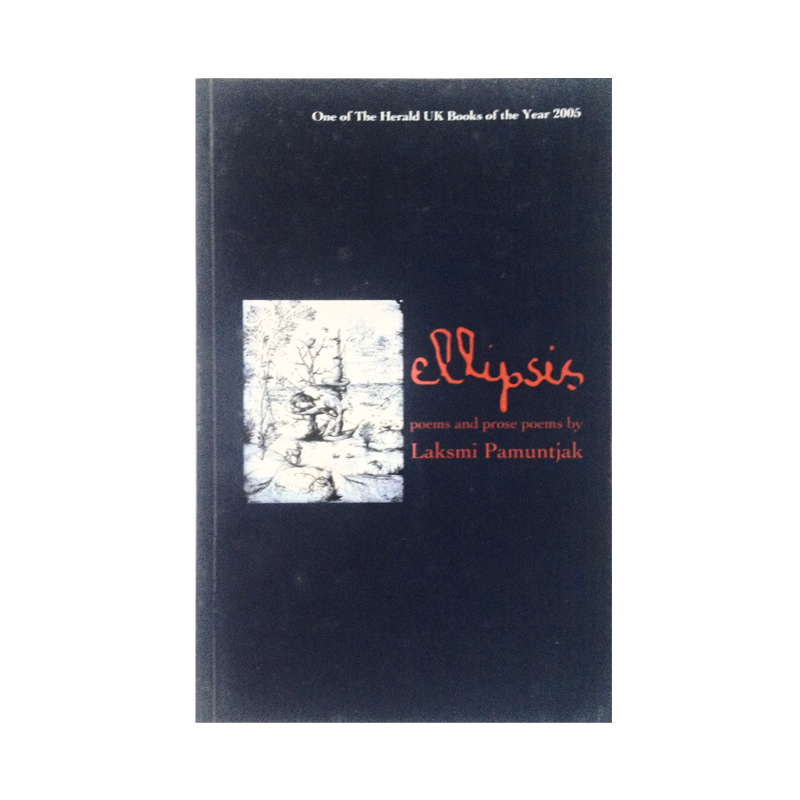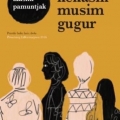Synopsis
‘Ellipsis’: omission of the implied word. A metaphor for a flight: the flight of a word from a sentence that may bind it to too fixed a meaning, perhaps, or even an escape from the imperialization of a singular possibility, identity, purpose. A thinking, willing flight, that is: active, modern, an act of free will. In her first book of poetry, Laksmi Pamuntjak finds a space, a private sanctuary, where language can just freely be, accountable to nothing and no one. Rather, it bids her to the space of things. To the storeroom of each memory that comes to mind—a half-forgotten phrase, the edges and elbows of a song, scraps of urban legend, a mythological creature, an immediate visual experience, a sound that reverberates through a landscape—witnesses all to the fact that we do not live in a vacuum, that we do not only consist of one side, and that there is something there that multiplies our voices into other places. It is when we hear that echo that we know there is a ‘meaning’ or a value far greater than ‘comprehension.’ And thus Laksmi speaks about love in all its guises and permutations, travel to faraway places, a mother’s prayers, food and sex, mythology and music, Sylvia Plath. Some of the poems in Ellipsis were introduced for the first time at the Singapore Writers Festival, August 2005.
Format: Paperback, 90 pages. Publisher: Pena Klasik. Available from Select Bookstore, Kinokuniya (Singapore), $12.60, QB World, Aksara Bookstore, TB Lontar (Jakarta), Rp 30.000
Praise for "Ellipsis":
-
Aesthetically intense and powerfully sensual poetry collection. The poetry is attuned, meticulous, deft and the reader is transfigured by a 'lea of silences.'
- The Herald UK (Scotland)
-
Lyrical and elegiac, Laksmi Pamuntjak's poetry moves you with the speed of a heartache.
- Felix Cheong, author of Temptation and Other Poems and Broken by the Rain, Recipient of the National Arts Council's Young Artist of the Year for Literature Award, 2000
-
Pamuntjak writes in the introspective style that is at once intimate -- but also, in the poetâs own words â âgiddy, glowing, red hot
- Cyril Wong, author of Squatting Quietly, Below: absence, the end of his orbit
-
Ellipsis shows the working of a feminine sensibility, a refined one at that, in exploring human (woman) being in her full-spectrum: roles, relations, desires, wounds, memories. The poems are the word not said in speech; the way of the subtle arising unannounced: the timelessness in the temporal, the extraordinary out of the ordinary, absence in presence - echoed through and through in Laksmi's poems.
- Nukila Amal, author of Cala Ibi and Laluba
-
"Ellipsis contains some of the freshest, most sensual poems I have ever read. Laksmi Pamuntjak splays the mess and fragility, the embarrassing physicality, of human relationships. But she spans a far broader canvas - politics, religion, the touch and smell of many lands - and perhaps most importantly for an artist, with an unresolved aesthetic intensity, immanent in every one of her texts is the question, why? From the miniaturized Hieronymus Bosch âThe Tree Manâ on the bookâs cover, Ellipsis takes us on a journey across continents, through the brush of forest leaves, the pungent aroma of diesel fumes, the dank, entangled limbs of lovers, the intimate ferocity of motherhood, the blinding, white concrete of cityscapes-without-end, all inspissated with a âlea of silences.â Through this substrate of âhuman doughâ and Bourbon, from âShanghai Risingâ to âDawnâs Antigoneâ, surely âneither sin nor Satanâ could have conceived such a box of song and text. In both the verse poetry and the prose poetry (or âpoetic proseâ - but such divisions in any case are arbitrary), the writing is diamond-cut yet visceral, suffused with intellect yet shamanic. Pamuntjak is âA Composer Driving in the Rainâ, a âpeddlerâ of wondrous tangents, cracked vessels, âwounds without poulticeâ. In Ellipsis, there are no masks, no mirrors, just truth, caught momentarily like a silhouette, like âashes falling before [our] eyesâ. Pamuntjakâs poetic ear is so attuned, her eye so meticulous, her fingers so deft that at times, sometimes by passion, sometimes by mere nuance, like a rasik the reader is transfigured. And so, we move through the rational, the intuitive, the spiritual, to the beyondâŚâ
- Suhayl Saadi, author of Psychoraag
-
... hard not to get caught up in the (poems') sheer energy and celebration of language, or as Pamuntjak writes, 'a world of the word.
- The Straits Times (Singapore)


